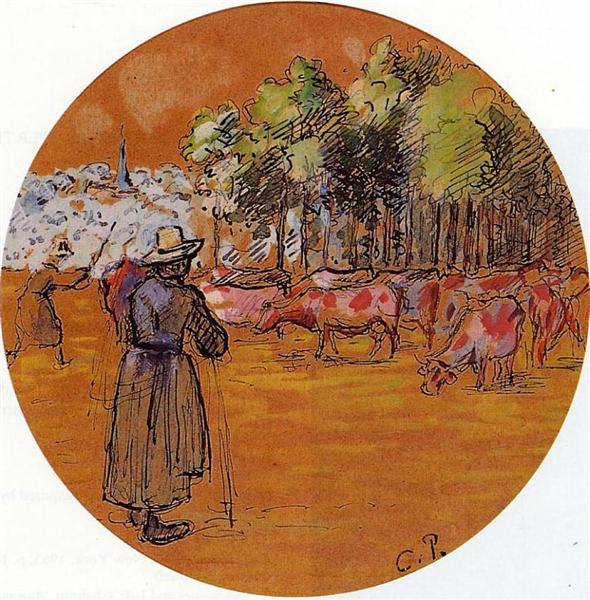Tanım
1890'da oluşturulan Camille Pissarro'nun "Vacas Çobanları - Bazincourt" çalışması, sanatçının üretimini karakterize eden izlenimcinin muhteşem bir örneğidir. Bu resimde, Pissarro kırsal bir manzarayı, çalışmalarına dalmış çobanların doğaya basit ve yakın bir yaşamın enkarnasyonu haline geldiği uyandırıcı bir şekilde yakalar. Sahne, bölgeye transfer edildikten sonra Pissarro için önemli olan ve zengin bir ilham kaynağı bulduğu Bazincourt'tan geçiyor.
Çalışmanın bileşimi, birlikte bir huzur ve uyum hissi yaratan elementlerin hassas bir karışımıdır. Pissarro, otlatmanın çevrenin genişliği ile iç içe olduğu manzaraya geniş bir bakış açısından doğal bir yaklaşım kullanıyor. Ön planda, iki çoban figürü bir grup inekin yanındadır ve pastoral bir ortamda insanlar ve hayvanlar arasında elle tutulur bir bağ yaratır. Rakamlar basit ve doğrudan bir şekilde temsil edilir, genellikle manzara ile eriyebilir ve kırsal yaşamdaki rollerini çerçeveliyor.
Bu çalışmada renk kullanımı bahsetmeye değer. Pissarro, çimlerin yeşili ve dünyanın kahverengi ve sarı tonlarını düşünen bir sıcak ve korkunç ton paleti kullanır. Işık, sahnenin yakalandığı günün saatini, muhtemelen sabah sakin veya akşamın bir anı olduğunu gösteren bir incelikle resminde temel bir rol oynar. Gevşek fırça darbeleri ve doldurma kullanımı, resmin renklerinin ve resmin atmosferine katkıda bulunur, aksi takdirde statik görünebilecek bir ortamda hareket ve yaşam önerir.
Çobanlar, ayrıntılı olarak sunulmasalar da, Pissarro'nun çalışmalarında, dikkatlerini tarlanın işçilerinin hayatlarına odaklayan tekrarlayan bir tema olan Dünya ile sağlamlık ve bağlantı duygusu ile temsil edilir. Rakamların görevlerinde ısrar etme şekli sadece kırsal işin anlatısını yeniden teyit etmekle kalmaz, aynı zamanda sanatçının işin değeri ve günlük yaşamın haysiyeti konusundaki felsefesi ile de yankılanır.
Pissarro, genellikle izlenimciliğin babası olarak kabul edildi, kariyeri boyunca ışık, renk ve dokuları sürekli olarak keşfediyordu. "İnek Papazları - Bazincourt", doğal dünyanın gözlemlenmesine ve idealizasyona ilgisizliğe olan bağlılığı yansıtır. Hayatının bu noktasında Pissarro, izlenimci hareketin teknik yeniliklerine de dikkat ediyordu, bu manzarayı akademik sözleşmelerden uzaklaşan bir stille yürüttü ve bu da onu daha modern bir sanatın öncüsü haline getirdi.
Buna ek olarak, bu çalışmanın yaratılması döneminde Pissarro'nun diğer önde gelen izlenimcilerle temas halinde olduğunu ve yeni sanatsal teknikleri ve perspektifleri keşfetmeye devam ederken stilinin dönüştürüldüğünü belirtmek ilginçtir. Bu nedenle çalışma, izlenimcilik mirası ile sanat ufukunda şekillenmeye başlayan en modernist akımlar arasında bir köprüdür.
Özetle, "Çobanlar - Bazincourt" sadece kırsal yaşamda bir anın bir çalışması değil, aynı zamanda insanın çevresi ile yakınlığı üzerine bir açıklama, Pissarro'nun doğaya ve sürdürülebilir çalışmaya karşı hissettiği derin saygıyı ve bağlantıyı uyandırıyor. İzlenimci sanat corpus'un bir parçası olarak, bu çalışma bizi sadece bakma eylemini değil, aynı zamanda gerçek bir dikkatle görme eylemini de durdurmaya ve düşünmeye davet ediyor.
KUADROS ©, duvarınızda ünlü bir boya.
Profesyonel sanatçıların kalitesi ve ayırt edici mührü ile el yapımı yağlı boya boya tablolar KUADROS ©.
Memnuniyet garantisi ile resim reprodüksiyon hizmeti. Resminizin kopyasından tamamen memnun değilseniz, paranızı%100 iade ederiz.

